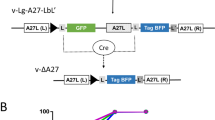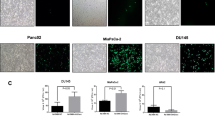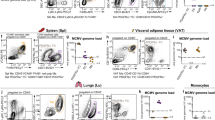Abstract
A TEMPERATURE-SENSITIVE (ts) mutant of the highly oncogenic group A (ref. 1) human adenovirus type 12 (H12), H12ts401 (ref. 2) is unable to establish stable transformation of cells in restrictive conditions3. Cells transformed by ts401 at the permissive temperature and shifted to nonpermissive temperatures show a reversion to a normal phenotype; wild-type H12-transformed cells, in contrast, exhibit a transformed phenotype when grown in either restrictive or permissive conditions4. The temperature sensitivity of the transformed phenotype of the ts401 mutant-transformed cells suggests that the continued expression of gene 401 is required for maintenance of the transformed cell phenotype. This study was initiated to detect the H12 transformation-specific protein(s) in H12-transformed cell lines. We identify here a 60,000 molecular weight transformation-specific antigen in H12-transformed rat 3Y1 cells5,6 by immunoprecipitation of 35S-methionine labelled polypeptides with serum from H12 tumour-bearing hamsters. Furthermore, the expression of this antigen is temperature dependent in 3Y1 cells transformed by ts401. Further characterisation of the 60,000 MW antigen may lead to an understanding of the molecular mechanism of adenovirus cell transformation.
This is a preview of subscription content, access via your institution
Access options
Subscribe to this journal
Receive 51 print issues and online access
$199.00 per year
only $3.90 per issue
Buy this article
- Purchase on Springer Link
- Instant access to full article PDF
Prices may be subject to local taxes which are calculated during checkout
Similar content being viewed by others
References
Green, M. A. Rev. Biochem. 39, 701–756 (1970).
Ledinko, N. J. Virol. 14, 457–468 (1974).
Ledinko, N. J. Virol. 26, 828–831 (1978).
Ledinko, N. Proc. Annu. Mtg Am. Soc. Microbiol. Abstr. S99, 229 (1978).
Kimura, G. et al. Int. J. Cancer. 10, 894–706 (1975).
Hama, S. & Kimura, G. J. Virol. 25, 907–911 (1978).
Kessler, S. W. J. Immun. 115, 1617–1624 (1975).
Levinson, A. D. & Levine, A. J. Cell 11, 871–879 (1977).
Fujinaga, K. et al. Proc. Japan Acad. 53, 152–155 (1977).
Graham, F. L. et al. Cold Spring Harb. Symp. quant. Biol. 39, 637–650 (1974).
Flint, S. J. et al. Virology 72, 456–470 (1976).
Shiroki, K. et al. Virology 82, 462–471 (1977).
Biron, K. K. et al. Virology 464–474 (1978).
Russell, W. C. & Skehel, J. J. J. gen. Virol. 20, 195–209 (1973).
Vasconcelos-Costa, J. et al. Virology 52, 337–343 (1973).
Rosenwirth, B. et al. Virology 67, 14–23 (1975).
Chinnadurai, G. et al. Biochem. biophys. Res Commun. 74, 1199–1205 (1977).
Mulder, C. et al. J. Virol. 14, 68–77 (1974).
Raska, K., Jr et al. FEBS Lett. 62, 173–176 (1976).
Biron, K. K. & Raska, K., Jr Virology 76, 516–526 (1977).
Gilead, Z. et al. Nature 264, 263–266 (1976).
Maurer, H. R. & Allen, R. C. Z. klin. Chem. klin. Biochem. 10, 220–225 (1976).
ORTEC Application Note AN32A (Ortec Inc., Oak Ridge, Tennesee).
Bonner, W. M. & Laskey, R. A. Eur. J. Biochem. 46, 83–88 (1974).
Laskey, R. A. & Mills, A. D. Eur. J. Biochem. 56, 335–341 (1975).
Author information
Authors and Affiliations
Rights and permissions
About this article
Cite this article
LEDINKO, N. Transformation-specific antigen induced by oncogenic human adenovirus. Nature 274, 812–813 (1978). https://doi.org/10.1038/274812a0
Received:
Accepted:
Issue Date:
DOI: https://doi.org/10.1038/274812a0
Comments
By submitting a comment you agree to abide by our Terms and Community Guidelines. If you find something abusive or that does not comply with our terms or guidelines please flag it as inappropriate.



